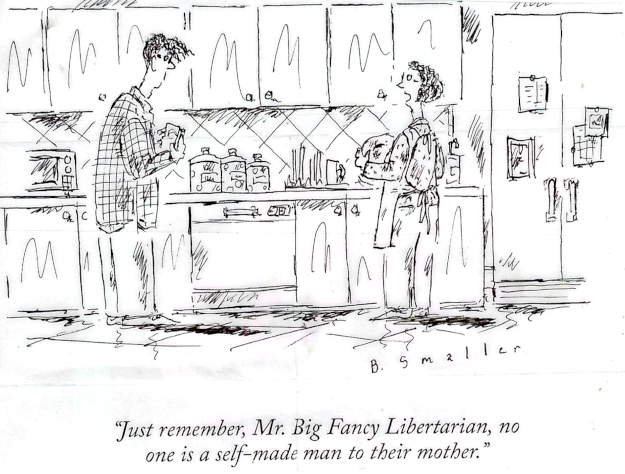Vincent Cook wrote the following for Mises Wire:
https://mises.org/mises-wire/debunking-myth-market-fundamentalism
Supporters of the “National Conservative” (or “NatCon”) movement that has taken over the Republican Party have lately been accusing libertarians of letting their “market fundamentalism” get in the way of politicians taking practical steps to save American society from its problems. In the foreword to his book Rebuilding American Capitalism, Oren Cass—chief economist of the influential American Compass think tank—declares himself in favor of an interventionist policy:
Rebuilding American capitalism is a quintessentially conservative task. Libertarians cannot understand the many supports that capitalism requires or countenance a role for government in supplying them. Progressives are disdainful of a system that leaves so much to private ordering and are eager to use public programs to provide whatever the market does not. Only conservatives have the necessary gratitude for what has worked before, preference for a free enterprise system that both grants liberty and imposes obligations, and comprehension of the need for institutions to shape market actors and constraints to channel productively their ambition.
In his characterization of American politics in recent decades, he blames conservatives who embraced economic freedom for undermining communities, promoting financialization and globalization over domestic industrialization, and undercutting the supposedly positive good of labor unions:
The accompanying agenda of tax cuts, deregulation, and free trade was well suited to an ideology of freedom disconnected from any conception of flourishing, but as economic policy it was a disaster for the nation. Globalization crushed domestic industry and employment, leaving collapsed communities in its wake. Financialization shifted the economy’s center of gravity from Main Street to Wall Street, fueling an explosion in corporate profits alongside stagnating wages and declining investment. The decline of unions cost workers power in the market, voice in the workplace, and access to a vital source of communal support. These trends, actively cheered on the Right, contributed to rising inequality, slowing innovation, narrowing of opportunity, and loss of middle-class security.
There are a host of fallacies and errors in Cass’s “market fundamentalist” arguments, but let’s focus on a couple of basic concepts. The first key concept—libertarianism—is a political philosophy that espouses much more than just free markets; the defining principle of libertarianism is that competent individuals ought to be at liberty to do anything that doesn’t initiate aggression against the rights of other individuals, and those rights are conceived of in terms of every person’s ownership of oneself and of one’s peacefully-acquired property. This means an owner has exclusive control over the use and disposition of everything one owns.
Exclusion by owners is just as critical to a libertarian society as the freedom of consenting adults to do their own thing in markets. Such private discrimination implies that anti-social individuals who flout cultural norms that facilitate social cooperation or who embrace self-destructive lifestyles can’t compel others to bear the costs of their irresponsible conduct. The school of hard knocks and tough love characteristic of a free society is a much sterner teacher of morality than any vain attempt by governments to coerce virtue, as vices are not crimes and politicians are too ignorant of particular circumstances and too easily corrupted by power to be entrusted with the task of dictating morals to others.
Erroneously equating libertarianism with “market fundamentalism” evades many of the important distinctions between libertarian, conservative, and progressive attitudes regarding the political significance of tradition and cultural change. For a libertarian, neither tradition nor change are inherently good or bad. Rather, the intellectual and moral autonomy of competent adults made possible by their ownership rights is essential to their discovery, realization, and appreciation of whatever values optimize their pursuit of happiness. Both conservation of genuinely valuable traditions and progress towards genuinely improved values require that each individual be free to deviate from traditions, but also be obligated to suffer (or enjoy as the case may be) the consequences of their deviancy.
Libertarianism promotes a healthier evolution of culture, incentivizing assimilation to a common language and norms genuinely reflecting needs arising from human nature and from requirements for social cooperation, while also permitting the formation and peaceful co-existence of divergent subcultures that best serve the more particularized needs of different subsets of society. It is a libertarian social order that best preserves the traditions that are truly worth conserving and best facilitates the cultural changes that truly represent progress, all without anyone having to wage a “culture war” to assure the supremacy of their own particular ends against all others. As Ludwig von Mises explained regarding the relationship between divergent individual ends and social cooperation:
Society is not an end but a means, the means by which each individual member seeks to attain his own ends. That society is possible at all is due to the fact that the will of one person and the will of another find themselves linked in a joint endeavor. Community of work springs from community of will. Because I can get what I want only if my fellow citizen gets what he wants, his will and action become the means by which I can attain my own end. Because my willing necessarily includes his willing, my intention cannot be to frustrate his will. On this fundamental fact all social life is built up.
Once we grasp Mises’s insight that society serves as a means for simultaneously realizing many divergent ends and not as an end in itself, it becomes clear that libertarianism is by not “disconnected from any conception of flourishing” as Mr. Cass claims. Individuals must judge for themselves what their “flourishing” requires, and private ownership is the institution that secures their independent judgements within society. Imposing values on them by force cripples their ability to use their own reason and personal experiences to align their values with their innate nature and with their ability to function in society. It is the NatCon ideology that is disconnected from any conception how coupling liberty to personal responsibility is what best facilitates everyone’s pursuit of happiness.
This brings us to the second key concept. Capitalism is an economic system characterized by private ownership of the means of production; in its purest laissez-faire form, it emerges as a logical corollary of libertarianism. Inherent in capitalism is the principle that only the capitalist owner has discretion over the use and disposition of his or her capital. Whenever a government steps in to “shape” the capitalist and “channel” the capitalist’s ambition with respect to the use of capital as Cass demands, it is government (i.e., certain political elites) and not the capitalist that controls the ultimate use and disposition of that capital. Government becomes the de facto owner of the means of production, while the de jure private owner becomes just another cog in the government’s bureaucratic machine.
Socialism is the correct name for any economic system where production is dominated by such government planning, and corporatism is the correct name for the form of socialism where such a legal fiction of private ownership is retained. There is no third system that can split the difference between capitalist and socialist direction of how a capital good is used, as Mises explained in his article showing how a middle of the road policy leads to socialism.
Mr. Cass denies that he wants to completely overturn the private ordering of production in favor of socialism; his view is that capitalism should be “properly buttressed and constrained” by interventionist measures so that the economy will “serve not only the family and community, but also the nation.” As he sees it:
The conservative vision thus requires that markets not only allocate capital to productive uses and serve consumers at the lowest possible price, but also create the range of secure and dignified jobs in which people of varying aptitudes, with varying interests, in varying places can build decent lives. Over time, the market must produce growth that is widely shared and sustainable—a term coopted by the environmental movement but applicable as well to other foundations of a free and prosperous nation that market forces will tend to erode. The industrial commons requires protection, to ensure that its capital base, talent pool, and centers of innovation fuel productivity gains and provide for the national defense. So does the labor market, to ensure that the nation’s workers are essential to economic success and prepared for contributing to it. So does the social fabric, to ensure a sense of place, caring relationships built on mutual obligation, and the solidarity to solve problems and counter threats.
There is much in Cass’s complaints about capitalism that echo leftist progressive rhetoric. NatCons and progressives are in fundamental agreement that a laissez-faire capitalist system that prioritizes serving consumer desires doesn’t serve either of their utopian “visions” of what society ought to be. In focusing their attacks on capitalism serving consumer desires, both sorts of anti-libertarians ignore the fact that a capitalist system also incentivizes catering to desires for better working conditions, for increases in the stocks of capital goods and of labor skills, and for building caring relationships with one another. One can’t properly blame capitalism if one opines that such things aren’t abundant enough.
Rather, there are two suspects who can be blamed. First, maybe most Americans—not sharing Cass’s vision—don’t desire such things as urgently as he thinks they should and aren’t willing to sacrifice other things they desire more highly. In that case, resorting to interventionism instead of voluntary persuasion amounts to NatCons tyrannically imposing their values on others by sabotaging capitalism. Interventionism as a means of waging cultural warfare can only tear apart the social fabric, sow the seeds of mutual hatred and conflict, and dissolve whatever sense of solidarity Americans might have. Moreover, one can scarcely sabotage capitalist production for very long without having to substitute another system of production for it. Whether Cass intends it or not, NatCon interventionism would propel us towards a corporatist variety of socialism.
Second, maybe the American economy hasn’t really been all that free despite whatever “market fundamentalism” conservatives have been preaching. The empirical evidence of the past fifty-four years points to burgeoning welfarism and its funding via fiat money creation being the primary causes of America’s deindustrialization. NatCon interventions such as an industrial slush fund, protective tariffs, and increased government spending can only accelerate deindustrialization. It is the self-evident fact of man’s purposefulness and its logical implications—not any blind “fundamentalist” faith in markets—that leads to the irrefutable conclusion that we need more private ownership and personal responsibility to correct this problem, not more government controls and promises of free stuff. It is the NatCons who are guilty of peddling faith-based economic fallacies.

